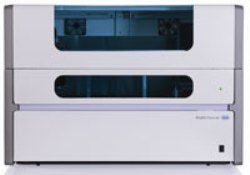Roche Applied Science has introduced the LightCycler Real-Time PCR Instrument and the MagNA Pure Sample Preparation System to streamline the functioning methodology for identifying Escherichia coli (EHEC) bacterium.
 Magna Pure 96 System
Magna Pure 96 System
The LightCycler instrument and the MagNA system are being utilized to examine EHEC pathogens in stool samples.
In a research carried out by Olfert Landt, Udo Reischl, and Ralf Bialek, stool samples were processed by utilizing the robotic MagNA Pure 96 workstation. The MagNA workstation also isolates the total genomic DNA from faecal specimens. The LightCycler instrument targeted the genes of E. coli and showed that faecal specimens can be utilized to identify EHEC infection.
The robotic MagNA instrument separates nucleic acids obtained from 96 samples in nearly an hour. This offers a cost-efficient manner to develop template DNA from stool samples. The LightCycler PCR also delivers precise and reproducible results by using sensitive PCR probes and primers. The PCR targets EHEC’s Shiga toxin genes that come as LightMix kit EHEC.
The company set up a pathogen universal protocol by utilizing a 100 µl elution volume and 200 µl sample volume to assure the robustness of the overall workflow. The E. coli toxin genes were enhanced in the midst of hybridization probes. The LightCycler System then performed a melting curve analysis to discriminate the toxin genes. The parC gene was utilized to exclude PCB inhibitors and to prove the presence of extracted DNA. Systematic testing should substantially contribute to the detection of the EHEC infections in the early stages.